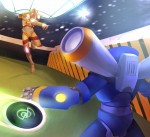A deep passion and maybe even brief flirtations with workplace insanity are fundamental for UCLA alumnus Scott Lee’s vision of success.
“It’s got to consume you, you’ve got to be insane. I’ll use Kobe Bryant (as an example). … He’s battered to death, yet he still goes to work every day and works harder than everyone else,” Lee said. “And if you’re not really that insane about what you do, you can probably succeed at it, but you can’t start it.”
And although Lee said he enjoys the sport of basketball, his true passion does not lie in shooting hoops, but in making video games.
Back in 2011, Lee became the co-founder and CEO of his very own video game development company, Smilu Inc. Tonight, Lee will speak at the Game Lab about his personal entrance into the video game industry, and what it takes to prosper both creatively and monetarily, an achievement which he said eludes many potential game creators.
“People love being creative. People love building these awesome things, but they don’t have a sense of the business. They don’t understand the ramifications behind the decisions they’re making financially,” he said.
For Lee, these truths about the video game industry were not learned by studying game design, computer science or even business. Instead, he earned his bachelor’s degree in history while at UCLA, served as the rush chair at the fraternity Zeta Beta Tau and went on to be an executive search consultant for the recruiting agency MRINetwork, where he regularly communicated with video game companies like Riot Games.
“I wanted to work in games, (but) I didn’t know what I wanted to do. … I had no skill set for it,” Lee said. “I have decent design sense, but it wasn’t matured at that time. From a visual standpoint, if I’m the visual director for your project, your project is probably going to be ugly. I knew I was good at the hustle and I was good at the sell, so I went into recruiting.”
Lee excelled at MRINetwork, and was eventually invited to join Riot Games as its director of recruitment. For about three years he was put in charge of a small team, where he headed up project management, event planning and the overall hiring process.
By early 2011 and the beginning of Riot Games’ rise to worldwide popularity because of its free online game “League of Legends,” Lee said he was ready to find his own fortune and successful startup company.
Soon thereafter, he teamed up with his longtime friend and UCLA fraternity brother Jefferson Liou to found Smilu Inc., the name of the company being a variation on the founders’ own names.
Liou, an economics alumnus and the unofficial financial head at Smilu Inc., said Lee’s previous leadership experience as both fraternity rush chair and director of recruitment at Riot Games adequately prepared his friend to take on the challenge of running his own company.
“It was a natural transition for him to come to this role where he has to rally people behind an idea and get them fired up to work on it,” Liou said. “And it’s not even just about getting people to do what he wants to do, it’s about igniting people to feel passionate about it themselves.”
Overtime, Lee and Liou said they hired new co-workers, reaching the 20 or so members Smilu Inc. now employs, while also gaining the knowledge base to create their first, soon-to-be-released game, “ICON: Arena,” described by Lee as a simple online game that combines elements of the classic title “Pong” with Capcom’s popular fighting franchise “Street Fighter.”
Implementing more of a flat business model into Smilu Inc., Lee said he believes this helps everyone at the company function on the same creative level.
“You want to make sure everyone is the smartest guy you know. You want A guys, because A guys hire A guys,” Lee said. “You can justifiably see everyone better than yourself.”
But even with this business approach, Smilu Inc. adviser Mick Giles said he is a little wary of any premature success, this being a startup company’s very first attempt at creating a video game.
However, he said he also believes in both Lee and the company’s determination to eventually achieve a profitable product.
“The success with games is extremely low, … but this is a group of people who are passionate about what they do,” Giles said. “So if ‘ICON: Arena’ does not do what they would hope, I think they’re going to continue to hammer away at it, until they ultimately come away with something that is a success.”
Comparing his potential workplace accomplishments to achieving new levels in a video game, Lee said the challenge of moving forward is worth the risk.
“The idea of playing games is you always get to progress, you always get to level up. That’s why you play games,” he said. “Working is that leveling up process, and if you don’t level up anymore, what left do you have to do?”
Email Reid at creid@media.ucla.edu.
